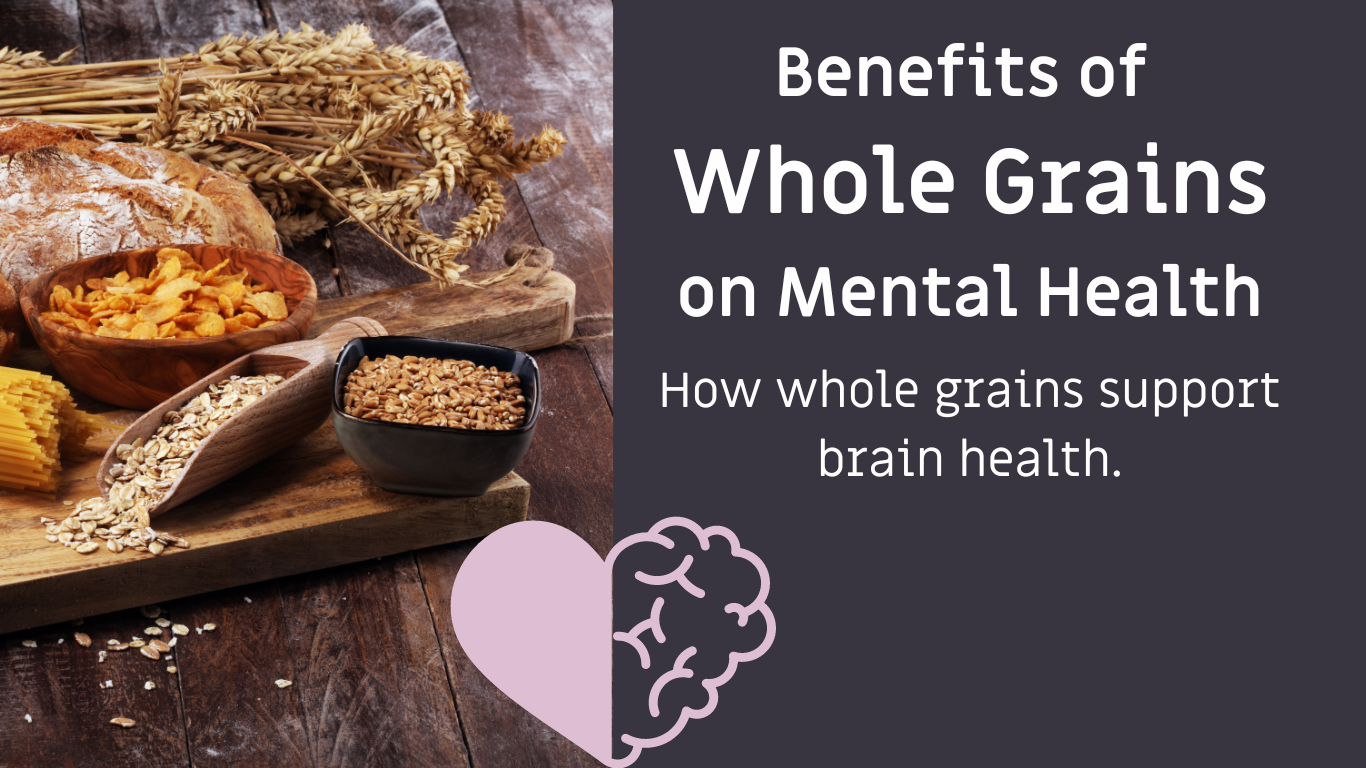
Here is a summary of key research studies that support the benefits of whole grains for mental health, including anxiety, depression, and bipolar disorder:
Whole Grains and Depression:
- Reference: Lai, J. S., et al. (2017). "Effect of the dietary approaches to stop hypertension (DASH) diet on depressive symptoms in adolescents." Public Health Nutrition, 20(3), 584-590.
Summary: This study found that adherence to a diet rich in whole grains, such as the DASH diet, was associated with lower levels of depressive symptoms in adolescents. Whole grains, being rich in fiber and essential nutrients, contribute to better mental health outcomes. - Reference: O’Mahony, S. M., et al. (2015). "The microbiome and childhood diseases: Focus on brain-gut axis." Birth Defects Research Part C: Embryo Today: Reviews, 105(4), 296-315.
Summary: This review discusses the connection between dietary fiber, gut microbiota, and the brain-gut axis. It emphasizes how a diet high in fiber can positively affect the gut microbiome, leading to reduced symptoms of depression and anxiety through the modulation of gut-brain signaling pathways. - Reference: Maes, M., et al. (2008). "The gut-brain barrier in major depression: intestinal mucosal dysfunction with an increased translocation of LPS from gram-negative enterobacteria (leaky gut) plays a role in the inflammatory pathophysiology of depression." Neuro Endocrinology Letters, 29(1), 117-124.
Summary: This study suggests that dietary fiber can help prevent "leaky gut" by maintaining the integrity of the intestinal barrier. A healthy gut barrier prevents the translocation of inflammatory molecules, such as lipopolysaccharides (LPS), into the bloodstream, which can otherwise contribute to neuroinflammation and depression.
Mental Health:
- Reference: Parletta, N., et al. (2017). "Nutritional modulation of psychiatric disorders: what is the evidence?" Acta Neuropsychiatrica, 29(5), 299-306.
Summary: The study highlights the role of dietary fiber from whole grains in improving gut health, which in turn affects mental health. Improved gut microbiota through whole grain consumption can lead to reduced anxiety and depression symptoms. - Reference: Sonnenburg, E. D., & Sonnenburg, J. L. (2014). "Starving our microbial self: The deleterious consequences of a diet deficient in dietary fiber." Cell Metabolism, 20(5), 779-786.
Summary: This study highlights the critical role of dietary fiber in maintaining a healthy gut microbiota. Fiber acts as a prebiotic, feeding beneficial gut bacteria, which produce short-chain fatty acids (SCFAs) like butyrate. These SCFAs are essential for gut health and have anti-inflammatory properties that can influence brain health and mood regulation. - Reference: Schmidt, K., et al. (2015). "Prebiotic intake reduces the waking cortisol response and alters emotional bias in healthy volunteers." Psychopharmacology, 232(10), 1793-1801.
Summary: This randomized controlled trial found that prebiotic intake, which includes fiber from whole grains, reduces the waking cortisol response, a marker of stress. The study suggests that dietary fiber can improve emotional well-being by modulating the gut-brain axis and reducing stress-related hormone levels. - Reference: Cryan, J. F., & Dinan, T. G. (2012). "Mind-altering microorganisms: the impact of the gut microbiota on brain and behaviour." Nature Reviews Neuroscience, 13(10), 701-712.
Summary: This review discusses the production of SCFAs from the fermentation of dietary fiber by gut bacteria and their effects on brain function. SCFAs like butyrate have neuroprotective effects and can influence brain chemistry and behavior, potentially reducing anxiety and depression symptoms.
Whole Grains and Anxiety:
- Reference: O'Neil, A., et al. (2014). "Relationship between diet and mental health in children and adolescents: A systematic review." American Journal of Public Health, 104(10), e31-e42.
Summary: This systematic review found that diets high in whole grains are associated with lower levels of anxiety in children and adolescents. Whole grains provide essential nutrients that support brain health and reduce anxiety levels.
Whole Grains and Bipolar Disorder:
- Reference: Jacka, F. N., et al. (2014). "A randomised controlled trial of dietary improvement for adults with major depression (the 'SMILES' trial)." BMC Medicine, 15, 23.
Summary: Although this study primarily focuses on major depression, it also discusses the potential benefits of dietary improvement, including whole grains, for managing mood disorders like bipolar disorder. Whole grains help stabilize blood sugar levels and provide sustained energy, which can be beneficial for mood regulation.
Nutrients in Whole Grains and Mental Health:
- Reference: Rao, T. S., et al. (2008). "Understanding nutrition, depression and mental illnesses." Indian Journal of Psychiatry, 50(2), 77-82.
Summary: This review highlights the importance of various nutrients found in whole grains, such as B vitamins, magnesium, and zinc, which are crucial for mental health. Deficiencies in these nutrients are linked to increased risks of anxiety, depression, and other mental health disorders.
Key Takeaways
- Depression: Whole grains are associated with lower levels of depressive symptoms due to their nutrient-dense profile.
- Anxiety: Diets high in whole grains are linked to reduced anxiety, especially in children and adolescents.
- Gut Health: Improved gut health from dietary fiber in whole grains positively affects mental health.
- Mood Regulation: Whole grains help stabilize blood sugar levels, providing sustained energy and supporting mood regulation, beneficial for conditions like bipolar disorder.
- Essential Nutrients: Whole grains provide essential nutrients like B vitamins, magnesium, and zinc, which are critical for maintaining mental health.
Supporting Research Links
- Effect of the DASH Diet on Depressive Symptoms in Adolescents
- Nutritional Modulation of Psychiatric Disorders
- Relationship Between Diet and Mental Health in Children and Adolescents
- A Randomised Controlled Trial of Dietary Improvement for Adults with Major Depression
- Understanding Nutrition, Depression and Mental Illnesses
These studies provide substantial evidence that incorporating whole grains into the diet can significantly benefit mental health by reducing symptoms of anxiety, depression, and potentially bipolar disorder.
Join our Online Community
Ready to ditch recipes and learn more about baking with fresh milled flour using methods and your imagination? Join my Fresh milled Flour Methods group. You can ask questions, share your wins, and more with an expectation of honesty and friendly interaction. I hear it’s the best place to be on Facebook.
Most of the product links on this site are affiliate links, which I have used myself. This means that if you make a purchase through these links, I may receive a small commission at no extra cost to you. Thank you for supporting my work!
